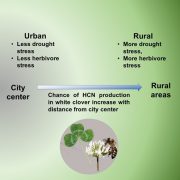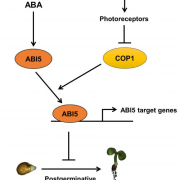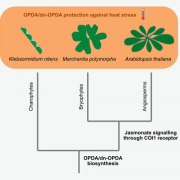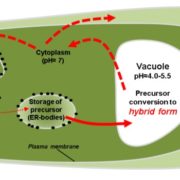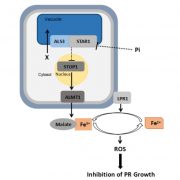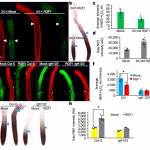CSN5 of COP9 signalosome modulates heat-response of Arabidopsis (biomolecules)
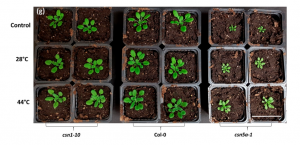 COP9 signalosome (CSN) is a conserved multi-subunit complex in higher eukaryotes that was originally identified as a regulator of plant photomorphogenesis. It functions by regulating ubiquitin-mediated protein stability, through the deneddylase enzymatic acitivity of the CSN5 subunit. CSN5 is encoded by two genes, and the csn5a-1 mutant shows a deficiency of deneddylation, leading to hyper-neddylation of the ubiquitin ligase CUL1 (a ubiquitin scaffold protein). Recently, Singh et al. found that heat-treated csn5a-1 mutants showed an increase in cell size, ploidy, photosynthetic activity, and an upregulation of genes connected to the auxin response. Because auxin signaling is enhanced in heat-treated Arabidopsis seedlings, this shows that CSN5 contributes to maintaining auxin homeostasis in response to heat. This study opens new dimensions of CSN biology, as it explores the responses of COP9 signalosome in temperature responses. (Summary by Nanxun Qin) biomolecules 10.3390/biom9120805
COP9 signalosome (CSN) is a conserved multi-subunit complex in higher eukaryotes that was originally identified as a regulator of plant photomorphogenesis. It functions by regulating ubiquitin-mediated protein stability, through the deneddylase enzymatic acitivity of the CSN5 subunit. CSN5 is encoded by two genes, and the csn5a-1 mutant shows a deficiency of deneddylation, leading to hyper-neddylation of the ubiquitin ligase CUL1 (a ubiquitin scaffold protein). Recently, Singh et al. found that heat-treated csn5a-1 mutants showed an increase in cell size, ploidy, photosynthetic activity, and an upregulation of genes connected to the auxin response. Because auxin signaling is enhanced in heat-treated Arabidopsis seedlings, this shows that CSN5 contributes to maintaining auxin homeostasis in response to heat. This study opens new dimensions of CSN biology, as it explores the responses of COP9 signalosome in temperature responses. (Summary by Nanxun Qin) biomolecules 10.3390/biom9120805


